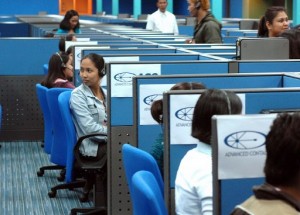
Filipino call center personnel attending to US client at a new business process outsourcing office in Manila. AFP FILE PHOTO
THAILAND—The Commerce Ministry is urging service operators to adopt the Philippines’ business model, since that country is one of the world’s major centers for the service sector.
“The Philippines’ economy has relied more on the service sector, which is a successful business model for developing the economy. About 60 per cent of its gross domestic product is from service businesses and it helps increase people’s incomes,” Amparwon Pichalai, director of the Trade Policy and Strategy Office, said yesterday.
The Philippines is now one of the world’s centers for information-technology service providers or business process outsourcing (BPO). Many multinational companies have invested in the Philippines.
The Philippines’ economy averages growth of 7.4 percent a year. The key businesses under BPO promotion plans are call centers and software developers.
The model is successful because the Philippines has ensured that its human resources possess multilingual communication skills, particularly in English. Its government supports innovation and creativity, and encourages people to get a higher education.
BPO is one of the top-priority support plans under the Philippine government, which wants to increase foreign direct investment.
With the changes in the global landscape, Thailand should no longer rely only on acting as a manufacturing hub and export center, Amparwon said. The country should focus more on developing its service businesses. The adoption of the BPO model in developing its human resources should make Thailand a center of the service business and investment by multinational companies.
Businesses that Thailand has high potential to develop are call centers, medical information management, logistics, software development, animation, hospitality, tourism and education. Thailand should also emphasize improving language skills, particularly in English, she said.
Enterprises have also been advised to penetrate key cities in the Philippines. Seven cities – Manila, Cebu, Davao, Baguio, Santa Rosa, Iloilo City and Bacolod – are now highly developed, while people have high purchasing power because the country is a global center for the IT business.
It is an opportunity for Thai exporters to promote more shipments to those cities of products such as food and beverages, seasonings, consumer goods, automobiles and parts, construction materials, jewelry and ornaments, home decorative items and clothes.
According to the ministry’s data, Thai shipments to the Philippines surged 13.9 percent in the first seven months of the year to US$3.14 billion, while shipments to other markets in Asean have shrunk.


